大数据库期末重要题型总结材料
数据库期末考试重点

数据库的地位:数据库技术是信息系统的核心和基础, 它的出现极大地促进了计算机应用向各行各业的渗透。
数据库的建设规模、数据库信息量的大小和使用频度已成为衡量一个国家信息化程度的重要标志。
数据库系统是最广泛使用的软件系统之一。
数据库研究, 开发与应用是计算机学科最活跃的领域之一。
数据库系统原理主要讲述结构化数据的管理实际应用对数据操作的要求:面临故障:各种各样的故障都可能发生,必须确保数据在任何情况下都不被破坏。
例如,银行存款数据不能因突然停电而丢失或破坏。
数据的安全性:防止用户对数据进行未经授权的访问。
例如,可以允许银行客户查看自己的存款余额,但不能允许他/她们修改。
数据的完整性:防止不符合语义的数据进入数据库。
例如,我们不能将负数作为学生的成绩输入到数据库中。
数据的一致性:防止数据库进入不一致状态数据库管理系统(DBMS)是一种重要的程序设计系统,它由一个相互关联的数据集合和一组访问这些数据的程序组成。
这个数据集合称为数据库,它包含了一个企业、政府部门或一个单位的全部信息。
DBMS的基本目标是提供一个方便、有效地访问这些信息的环境。
功能:1. 数据定义:提供数据定义语言(DDL),用于定义数据库中的数据对象和它们的结构2. 数据操纵:提供数据操纵语言(DML),用于操纵数据,实现对数据库的基本操作(查询、插入、删除和修改)3. 事务管理和运行管理:统一管理数据、控制对数据的并发访问保证数据的安全性、完整性. 4. 数据存储和查询处理:确定数据的物理组织和存取方式,提供数据的持久存储和有效访问,确定查询处理方法,优化查询处理过程5. 数据库的建立和维护:提供实用程序,完成数据库数据批量装载、数据库转储、介质故障恢复、数据库的重组和性能监测等6. 其他功能包括DBMS与其它软件通信异构数据库之间数据转换和互操作数据库(简称DB)是持久储存在计算机中、有组织的、可共享的大量数据的集合使用数据库的优点: (1) 数据整体结构化:在数据库中,数据的组织面向整个机构、面向所有可能的应用(2) 数据共享:数据库中的数据的面向整个机构组织使得它能够更好地被多个用户、多个应用程序共享。
总结数据库期末考试重点
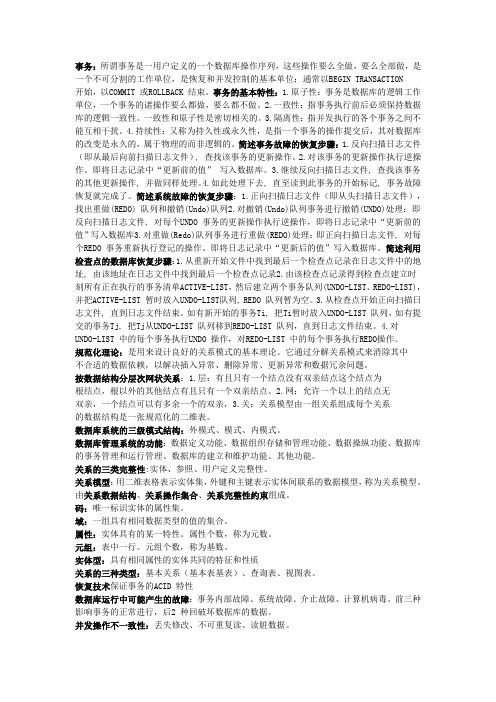
事务:所谓事务是一用户定义的一个数据库操作序列,这些操作要么全做,要么全部做,是一个不可分割的工作单位,是恢复和并发控制的基本单位;通常以BEGIN TRANSACTION开始,以COMMIT 或ROLLBACK 结束。
事务的基本特性:1.原子性:事务是数据库的逻辑工作单位,一个事务的诸操作要么都做,要么都不做。
2.一致性:指事务执行前后必须保持数据库的逻辑一致性。
一致性和原子性是密切相关的。
3.隔离性:指并发执行的各个事务之间不能互相干扰。
4.持续性:又称为持久性或永久性,是指一个事务的操作提交后,其对数据库的改变是永久的,属于物理的而非逻辑的。
简述事务故障的恢复步骤:1.反向扫描日志文件(即从最后向前扫描日志文件), 查找该事务的更新操作。
2.对该事务的更新操作执行逆操作。
即将日志记录中“更新前的值”写入数据库。
3.继续反向扫描日志文件, 查找该事务的其他更新操作, 并做同样处理。
4.如此处理下去, 直至读到此事务的开始标记, 事务故障恢复就完成了。
简述系统故障的恢复步骤:1.正向扫描日志文件(即从头扫描日志文件),找出重做(REDO) 队列和撤销(Undo)队列2.对撤销(Undo)队列事务进行撤销(UNDO)处理:即反向扫描日志文件, 对每个UNDO 事务的更新操作执行逆操作,即将日志记录中“更新前的值”写入数据库3.对重做(Redo)队列事务进行重做(REDO)处理:即正向扫描日志文件, 对每个REDO 事务重新执行登记的操作。
即将日志记录中“更新后的值”写入数据库。
简述利用检查点的数据库恢复步骤:1.从重新开始文件中找到最后一个检查点记录在日志文件中的地址, 由该地址在日志文件中找到最后一个检查点记录2.由该检查点记录得到检查点建立时刻所有正在执行的事务清单ACTIVE-LIST,然后建立两个事务队列(UNDO-LIST、REDO-LIST),并把ACTIVE-LIST 暂时放入UNDO-LIST队列, REDO 队列暂为空。
大学数据库考试重点内容

表存在的修改问题:插入—当插入某一行的时候,会产生null值问题。
更新—在某一行更新,会导致不一致的数据产生。
删除—在删除行的时候会丢失过多的数据。
如何解决的:可采用关系模型的方法将列表中这三个问题进行解决,即将多个单主题的表通过关系模型连接起来,如果一个表含有两个或多个主题,我们就将其分割成两个表。
关系:是指一种特殊类型的表,具体特征:表中每行存储了某个实体或实体某个部分的数据;表的每列包含了用于表示实体某个属性的数据;关系中每个单元格的值都必须为单值,不允许有重复的出现;每一列具有唯一名称,但列与列之间顺序任意;列与行的顺序任意;任意两行不具有完全相同的数据值。
关系与表的区别:在数据库中,人们通常将术语“表”与“关系”互换使用。
“表”的行和列在“关系”当中用元祖和属性表示。
根据关系的定义知道如果一个表含有重复的行,那么它就不是关系。
然而在实践中,这个条件常常被忽视。
特别是在使用DBMS对关系进行操作的时候,操作的结果往往造成了表包含重复的行。
为了使其成为关系,应该删除重复数据,但对于很大的表来说很耗时,因此在实践中,一些包含重复行的表仍成为关系。
关系与表的转换:规范化的过程:1.确认关系的所有的候选键。
2.确认关系中的所有函数依赖关系。
3.检查函数依赖关系的决定因子。
如果任何一个决定因子都不是候选键,则关系就存在规范化问题。
按下列方法处理:a.在它们自己的新关系中放置具有函数依赖关系的列。
b.让函数依赖关系的决定因子成为新关系的主键。
c.将决定因子的副本作为原始关系中的外键。
d.在新关系和原始关系中创建参照完整性约束。
4.根据需要,多次重复步骤3,直至每个关系的决定因子都是候选键。
规范化的步骤:根据规范化过程,首先确定所有的候选键。
2.根据规范化的步骤2,可以确定所有函数依赖关系。
3.根据步骤3,决定存在的决定因子是否为候选键。
SQL语言数据化结构查询语言叫SQL语言,它作为数据定义和操作的技术而出现,可以通过SQL完成查询,插入,更新和删除。
《数据库系统概论》期末考试重点总结【全】
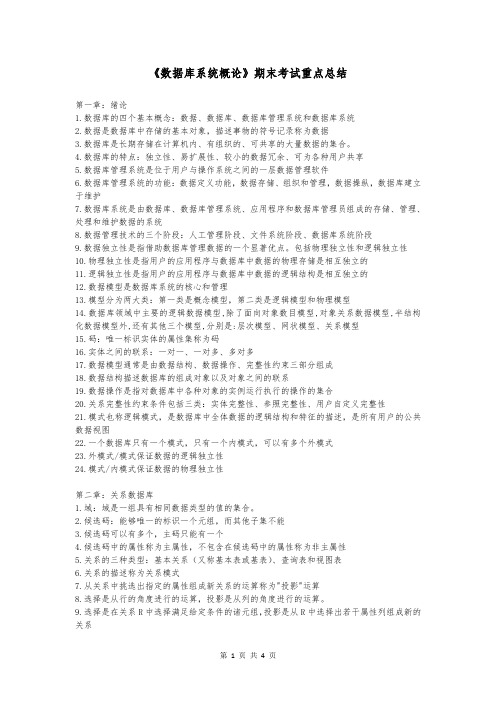
《数据库系统概论》期末考试重点总结第一章:绪论1.数据库的四个基本概念:数据、数据库、数据库管理系统和数据库系统2.数据是数据库中存储的基本对象,描述事物的符号记录称为数据3.数据库是长期存储在计算机内、有组织的、可共享的大量数据的集合。
4.数据库的特点:独立性、易扩展性、较小的数据冗余、可为各种用户共享5.数据库管理系统是位于用户与操作系统之间的一层数据管理软件6.数据库管理系统的功能:数据定义功能,数据存储、组织和管理,数据操纵,数据库建立于维护7.数据库系统是由数据库、数据库管理系统、应用程序和数据库管理员组成的存储、管理、处理和维护数据的系统8.数据管理技术的三个阶段:人工管理阶段、文件系统阶段、数据库系统阶段9.数据独立性是指借助数据库管理数据的一个显著优点。
包括物理独立性和逻辑独立性10.物理独立性是指用户的应用程序与数据库中数据的物理存储是相互独立的11.逻辑独立性是指用户的应用程序与数据库中数据的逻辑结构是相互独立的12.数据模型是数据库系统的核心和管理13.模型分为两大类:第一类是概念模型,第二类是逻辑模型和物理模型14.数据库领域中主要的逻辑数据模型,除了面向对象数目模型,对象关系数据模型,半结构化数据模型外,还有其他三个模型,分别是:层次模型、网状模型、关系模型15.码:唯一标识实体的属性集称为码16.实体之间的联系:一对一、一对多、多对多17.数据模型通常是由数据结构、数据操作、完整性约束三部分组成18.数据结构描述数据库的组成对象以及对象之间的联系19.数据操作是指对数据库中各种对象的实例运行执行的操作的集合20.关系完整性约束条件包括三类:实体完整性、参照完整性、用户自定义完整性21.模式也称逻辑模式,是数据库中全体数据的逻辑结构和特征的描述,是所有用户的公共数据视图22.一个数据库只有一个模式,只有一个内模式,可以有多个外模式23.外模式/模式保证数据的逻辑独立性24.模式/内模式保证数据的物理独立性第二章:关系数据库1.域:域是一组具有相同数据类型的值的集合。
大一数据库期末知识点总结
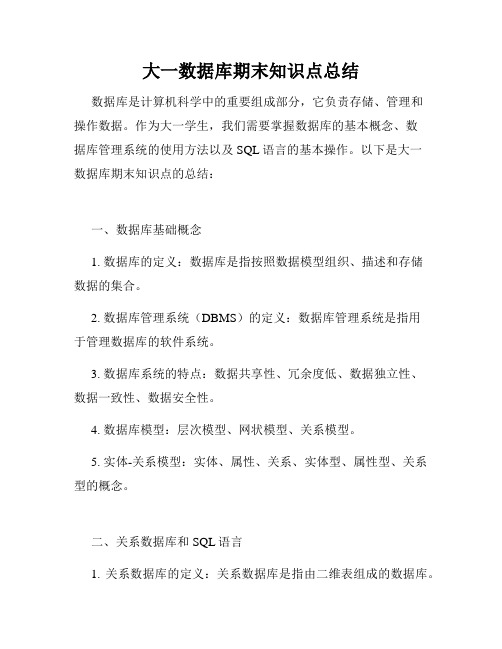
大一数据库期末知识点总结数据库是计算机科学中的重要组成部分,它负责存储、管理和操作数据。
作为大一学生,我们需要掌握数据库的基本概念、数据库管理系统的使用方法以及SQL语言的基本操作。
以下是大一数据库期末知识点的总结:一、数据库基础概念1. 数据库的定义:数据库是指按照数据模型组织、描述和存储数据的集合。
2. 数据库管理系统(DBMS)的定义:数据库管理系统是指用于管理数据库的软件系统。
3. 数据库系统的特点:数据共享性、冗余度低、数据独立性、数据一致性、数据安全性。
4. 数据库模型:层次模型、网状模型、关系模型。
5. 实体-关系模型:实体、属性、关系、实体型、属性型、关系型的概念。
二、关系数据库和SQL语言1. 关系数据库的定义:关系数据库是指由二维表组成的数据库。
2. 关系数据库的基本操作:选择、投影、联接、除操作。
3. SQL语言:SQL是结构化查询语言的缩写,用于管理关系数据库的查询和操作。
4. SQL语言的基本操作:查询数据(SELECT)、插入数据(INSERT)、更新数据(UPDATE)、删除数据(DELETE)。
5. 创建表格及设置约束:创建表格(CREATE TABLE)、设置主键、外键、唯一性约束等。
6. SQL函数和操作符:聚合函数(SUM、COUNT、AVG等)、条件操作符(LIKE、BETWEEN等)。
7. SQL查询语句的优化:避免使用SELECT *、合理使用索引、减少数据I/O。
三、数据库管理系统的使用1. 数据库系统软件安装:选择合适的数据库系统软件、安装过程的具体操作。
2. 数据库系统的配置和启动:配置数据库服务器、设置数据库端口、启动数据库服务器。
3. 数据库的创建和删除:创建数据库、删除数据库、备份和恢复数据库。
4. 数据表的创建和操作:创建表格、添加数据、修改数据、删除数据。
5. 数据表的查询和分析:单表查询、多表查询、数据排序、数据过滤。
6. 数据库索引的创建和优化:创建索引、优化索引性能。
数据库期末知识总结
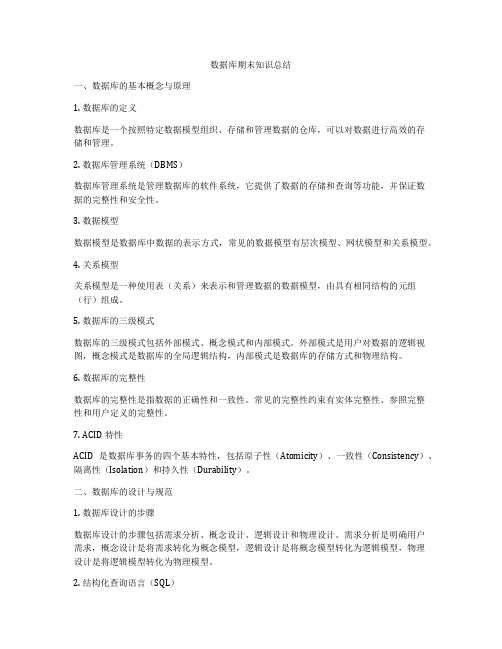
数据库期末知识总结一、数据库的基本概念与原理1. 数据库的定义数据库是一个按照特定数据模型组织、存储和管理数据的仓库,可以对数据进行高效的存储和管理。
2. 数据库管理系统(DBMS)数据库管理系统是管理数据库的软件系统,它提供了数据的存储和查询等功能,并保证数据的完整性和安全性。
3. 数据模型数据模型是数据库中数据的表示方式,常见的数据模型有层次模型、网状模型和关系模型。
4. 关系模型关系模型是一种使用表(关系)来表示和管理数据的数据模型,由具有相同结构的元组(行)组成。
5. 数据库的三级模式数据库的三级模式包括外部模式、概念模式和内部模式。
外部模式是用户对数据的逻辑视图,概念模式是数据库的全局逻辑结构,内部模式是数据库的存储方式和物理结构。
6. 数据库的完整性数据库的完整性是指数据的正确性和一致性。
常见的完整性约束有实体完整性、参照完整性和用户定义的完整性。
7. ACID特性ACID是数据库事务的四个基本特性,包括原子性(Atomicity)、一致性(Consistency)、隔离性(Isolation)和持久性(Durability)。
二、数据库的设计与规范1. 数据库设计的步骤数据库设计的步骤包括需求分析、概念设计、逻辑设计和物理设计。
需求分析是明确用户需求,概念设计是将需求转化为概念模型,逻辑设计是将概念模型转化为逻辑模型,物理设计是将逻辑模型转化为物理模型。
2. 结构化查询语言(SQL)SQL是用于与数据库进行交互的标准语言,包括数据定义语言(DDL)、数据操作语言(DML)、数据查询语言(DQL)和数据控制语言(DCL)等。
3. 关系数据库的规范化关系数据库的规范化是消除冗余和依赖的过程,包括第一范式(1NF)、第二范式(2NF)和第三范式(3NF)等。
4. 数据库的索引数据库的索引是提高查询性能的关键,常见的索引有B树索引、哈希索引和全文索引等。
5. 数据库的视图数据库的视图是基于表或查询结果构建的虚拟表,可以简化数据的访问和操作。
数据库考试试题总结

数据库考试试题总结第一篇:数据库考试试题总结数据库重点习题总结:(标注颜色的是我考到的简答题).试述数据、数据库、数据库系统、数据库管理系统的概念。
(l)数据:描述事物的符号记录称为数据。
数据的种类有数字、文字、图形、图像、声音、正文等。
(2)数据库:数据库是长期储存在计算机内的、有组织的、可共享的数据集合。
数据库中的数据按一定的数据模型组织、描述和储存,具有较小的冗余度、较高的数据独立性和易扩展性,并可为各种用户共享。
(3)数据库系统:数据库系统是指在计算机系统中引入数据库后的系统构成,一般由数据库、数据库管理系统(及其开发工具)、应用系统、数据库管理员构成。
(4)数据库管理系统:数据库管理系统是位于用户与操作系统之间的一层数据管理软件,用于科学地组织和存储数据、高效地获取和维护数据。
2.关系的完整性约束条件三大类:实体完整性,参照完整性,用户定义的完整性。
3.试述数据模型的概念、数据模型的作用和数据模型的三个要素。
数据模型是数据库中用来对现实世界进行抽象的工具,是数据库中用于提供信息表示和操作手段的形式构架。
数据模型通常由数据结构、数据操作和完整性约束三部分组成。
(l)数据结构:是所研究的对象类型的集合,是对系统静态特性的描述。
(2)数据操作:是指对数据库中各种对象(型)的实例(值)允许进行的操作的集合,包括操作及有关的操作规则,是对系统动态特性的描述。
(3)数据的约束条件:是一组完整性规则的集合。
完整性规则是给定的数据模型中数据及其联系所具有的制约和依存规则,用以限定符合数据模型的数据库状态以及状态的变化,以保证数据的正确、有效、相容。
4.试述数据库系统三级模式结构,这种结构的优点是什么?数据库系统的三级模式结构由外模式、模式和内模式组成。
外模式,是数据库用户能够看见和使用的局部数据的逻辑结构和特征的描述,是数据库用户的数据视图,是与某一应用有关的数据的逻辑表示。
模式,是数据库中全体数据的逻辑结构和特征的描述,是所有用户的公共数据视图。
数据库期末复习重点

数据库期末复习重点数据库期末重点1.数据是对客观事物的记录,是数据库中存储的基本对象。
2.数据的概念包括两⽅⾯:数据内容和数据形式3.信息是指数据经过加⼯处理后所获取的有⽤知识,或是说⼈们从数据中所得到的对客观事物的了解。
4.信息的特征:共享性、识别性、转换性、传递性、存储性、时效性。
5.数据处理是指从某些已知的数据出发,推导加⼯出⼀些新的数据。
6.数据管理是指对各种形式的数据进⾏收集、储存、加⼯和传播的⼀系列活动的总和。
7.数据管理技术发展的三个阶段:⼈⼯管理阶段、⽂件系统及数据库系统阶段。
8.数据库系统阶段的特点:a)数据结构化。
数据结构化是数据库与⽂件系统的根本区别。
b)较⾼的数据独⽴性。
⽤户能以简单的逻辑结构操作数据⽽⽆需考虑数据的物理结构。
c)数据共享。
在数据库系统中,数据不再仅仅服务于某个程序或⽤户,⽽成为若⼲程序或⽤户的共享资源,由数据库管理系统统⼀管理与控制。
d)⽅便的⽤户接⼝。
⽤户可以使⽤查询语句或终端命令操作数据库,也可以⽤程序⽅式操作数据库。
e)较强的数据控制能⼒。
并发控制能⼒、恢复能⼒、完整性能⼒、安全性能⼒等。
9.数据库系统(DBS,DataBase System)是⼀个计算机应⽤系统,由⽀持数据库运⾏的硬件、数据库、数据库管理系统、应⽤软件、数据库管理员和⽤户组成。
10.数据库是长期存储在计算机存贮介质上,有⼀定组织形式、可共享的数据集合。
11.数据库管理系统是介于⽤户和操作系统之间的⼀层数据管理软件,它为数据库的建⽴、运⾏和维护提供了统⼀的管理和控制。
12.数据库管理系统的作⽤:DBMS是数据库系统的核⼼,其功能的强弱是衡量数据库系统性能优劣的主要指标。
13.数据库应⽤a)程序是对数据的管理,在⼏乎所有的事务处理中都⽤到了数据库技术来管理数据。
这样的程序可以称为数据库应⽤。
14.数据库应⽤的分类:客户端应⽤程序和服务端应⽤程序15.⽤户a) 1.系统分析员b) 2.数据库设计⼈员c) 3.应⽤程序员d) 4.终端⽤户16.数据库体系结构a)三级模式:外模式、模式和内模式b)两个映射:外模式—模式映射、模式—内模式映射17.为什么DBMS具有较⾼的独⽴性(见课本P14)18.简述DBMS的⼯作过程(P15)19.DBMS的主要功能a)数据库定义功能b)数据库操作功能c)数据库控制和管理功能20.DBMS的特点:⼀个设计优良的DBMS,应该具有友好的⽤户界⾯、⽐较完备的操作功能、较⾼的运⾏效率、清晰的系统结构和良好的开放性等特点。
数据库原理期末复习总结

数据库原理期末复习总结数据库原理期末复习总结数据库原理复习总结第一章:1一个数据库应该有计算机硬件,数据库,数据库管理系统,数据库应用管理系统和数据库管理员。
数据整体性,数据的共享性。
2数据库管理经历了手工管理,文件管理,数据库技术三个发展阶段。
3数据库(DB)是一个按照数据结构来储存和管理数据的计算机软件系统。
4数据库管理系统(DBMS)是专门提供数据库管理的计算机软件系统。
5数据库管理系统能够为数据库提供数据的定义,建立,维护,查询和统计等操作功能,病完成对数据完整性,安全性进行控制的功能。
6数据库的特点:数据库系统已数据模型为基础,数据库系统的数据冗余度小,数据共享度高,数据库系统的数据和程序之间有较高的独立性,数据库系统通过DBMS进行数据安全性和完整性的控制,数据库中数据的最小存储单位是数据项。
7:数据的物理独立性是指应用程序对数据存储结构的依赖程度,数据的逻辑独立性是指应用程序对数据的全局逻辑结构的依赖程度。
8数据库系统的人员组成及数据库管理员的职责:①数据库管理员应该参与数据库和应用系统的设计,②数据库管理员应该参与决定数据库的存储结构和存取策略,③数据库管理员要负责定义数据的安全性要求和完整性条件,④数据库管理员负责监视和控制数据库系统的运行,负责系统的维护和数据恢复,⑤数据库管理员负责数据库的改进和重组。
9数据库的三级模式:外模式,内模式,模式。
数据库的二级映像技术是指内模式和模式,外模式和模式之间的映像。
10内模式和模式之间的映射定义保证了数据的逻辑模式与内模式之间的对应关系,当数据库的储存结构发生改变时,DBA可以通过修改模式/内模式之间的映射使数据模式不发生变化,拥有与程序和用户是按照数据的逻辑模式使用数据的,所以不变,还提供了内模式变化而程序不变的方法,从而保证了数据的物理独立性。
11外模式和模式之间的映射定义保证了外模式与数据模式之间的对应关系,映像通常保存在外模式中,当模式变化时,DBA可以通过修改映像的方法使得外模式不变还使得用户能够按子模式进行程序设计,同时也保证了数据的逻辑独立性。
数据库期末复习重点(含答案)

1.数据( Data ) :描述事物的符号记录称为数据2.数据库( DataBase ,简称 DB ) :数据库是长期储存在计算机内的、有组织的、可共享的数据集合。
3.数据库系统( DataBas 。
Sytem ,简称 DBS ) :数据库系统是指在计算机系统中引入数据库后的系统构成,一般由数据库、数据库管理系统(及其开发工具)、应用系统、数据库管理员构成。
4.数据库管理系统( DataBase Management sytem ,简称 DBMs ) :数据库管理系统是位于用户与操作系统之间的一层数据管理软件,用于科学地组织和存储数据、高效地获取和维护数据。
5.数据库系统的特点1.数据结构化数据库系统实现整体数据的结构化,这是数据库的主要特征之一,也是数据库系统与文件系统的本质区别2.数据的共享性高,冗余度低,易扩充数据库的数据不再面向某个应用而是面向整个系统,因此可以被多个用户、多个应用以多种不同的语言共享使用。
由于数据面向整个系统,是有结构的数据,不仅可以被多个应用共享使用,而且容易增加新的应用,这就使得数据库系统弹性大,易于扩充3.数据独立性高数据独立性包括数据的物理独立性和数据的逻辑独立性。
4.数据由 DBMS 统一管理和控制数据库的共享是并发的共享,即多个用户可以同时存取数据库中的数据甚至可以同时存取数据库中同一个数据6.数据管理技术的产生和发展数据库技术是应数据管理任务的需要而产生人工管理、文件系统、数据库系统7.数据库管理系统的主要功能( l )数据库定义功能; ( 2 )数据存取功能; ( 3 )数据库运行管理;( 4 )数据库的建立和维护功能。
8.数据模型的组成要素数据结构、数据操作及完整性约束条件数据模型的种类1.层次模型2.网状模型3.关系模型4.面向对象模型5.对象关系模型9.模式:概念模式,也称逻辑模式,是对数据库系统中全局数据逻辑结构的描述,是全体用户(应用)公共数据视图10.数据库系统中的DBMS为三级模式结构提供了两层映像机制:外模式/模式映像和模式/内模式映像。
数据库期末考试复习知识点总结
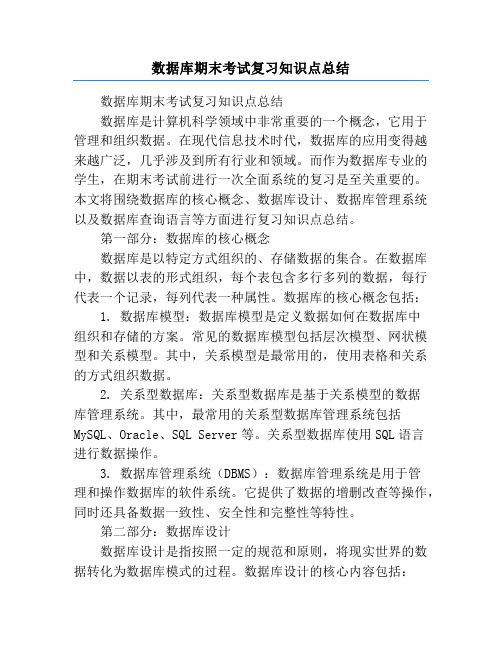
数据库期末考试复习知识点总结数据库期末考试复习知识点总结数据库是计算机科学领域中非常重要的一个概念,它用于管理和组织数据。
在现代信息技术时代,数据库的应用变得越来越广泛,几乎涉及到所有行业和领域。
而作为数据库专业的学生,在期末考试前进行一次全面系统的复习是至关重要的。
本文将围绕数据库的核心概念、数据库设计、数据库管理系统以及数据库查询语言等方面进行复习知识点总结。
第一部分:数据库的核心概念数据库是以特定方式组织的、存储数据的集合。
在数据库中,数据以表的形式组织,每个表包含多行多列的数据,每行代表一个记录,每列代表一种属性。
数据库的核心概念包括: 1. 数据库模型:数据库模型是定义数据如何在数据库中组织和存储的方案。
常见的数据库模型包括层次模型、网状模型和关系模型。
其中,关系模型是最常用的,使用表格和关系的方式组织数据。
2. 关系型数据库:关系型数据库是基于关系模型的数据库管理系统。
其中,最常用的关系型数据库管理系统包括MySQL、Oracle、SQL Server等。
关系型数据库使用SQL语言进行数据操作。
3. 数据库管理系统(DBMS):数据库管理系统是用于管理和操作数据库的软件系统。
它提供了数据的增删改查等操作,同时还具备数据一致性、安全性和完整性等特性。
第二部分:数据库设计数据库设计是指按照一定的规范和原则,将现实世界的数据转化为数据库模式的过程。
数据库设计的核心内容包括:1. 数据库需求分析:根据用户的需求,确定数据库的功能和应用场景。
需求分析是数据库设计的第一步,可以通过调研、访谈等方式进行。
2. 概念设计:概念设计是根据需求分析结果,抽象出数据库的逻辑结构和关系模式。
在概念设计中,需要确定实体、属性、关系等概念,并使用ER图进行可视化表示。
3. 逻辑设计:逻辑设计是将概念设计转化为关系模型的过程。
在逻辑设计中,需要使用关系模式表示实体和关系,确定关系的主键和外键关系。
4. 物理设计:物理设计是将逻辑设计转化为数据库的具体实现方案。
数据库期末考试题目总结
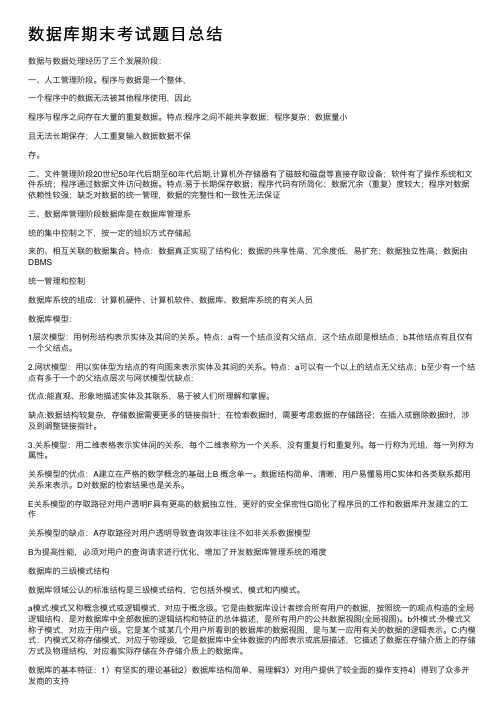
数据库期末考试题⽬总结数据与数据处理经历了三个发展阶段:⼀、⼈⼯管理阶段。
程序与数据是⼀个整体,⼀个程序中的数据⽆法被其他程序使⽤,因此程序与程序之间存在⼤量的重复数据。
特点:程序之间不能共享数据;程序复杂;数据量⼩且⽆法长期保存;⼈⼯重复输⼊数据数据不保存。
⼆、⽂件管理阶段20世纪50年代后期⾄60年代后期,计算机外存储器有了磁⿎和磁盘等直接存取设备;软件有了操作系统和⽂件系统;程序通过数据⽂件访问数据。
特点:易于长期保存数据;程序代码有所简化;数据冗余(重复)度较⼤;程序对数据依赖性较强;缺乏对数据的统⼀管理,数据的完整性和⼀致性⽆法保证三、数据库管理阶段数据库是在数据库管理系统的集中控制之下,按⼀定的组织⽅式存储起来的、相互关联的数据集合。
特点:数据真正实现了结构化;数据的共享性⾼,冗余度低,易扩充;数据独⽴性⾼;数据由DBMS统⼀管理和控制数据库系统的组成:计算机硬件、计算机软件、数据库、数据库系统的有关⼈员数据库模型:1层次模型:⽤树形结构表⽰实体及其间的关系。
特点:a有⼀个结点没有⽗结点,这个结点即是根结点;b其他结点有且仅有⼀个⽗结点。
2.⽹状模型:⽤以实体型为结点的有向图来表⽰实体及其间的关系。
特点:a可以有⼀个以上的结点⽆⽗结点;b⾄少有⼀个结点有多于⼀个的⽗结点层次与⽹状模型优缺点:优点:能直观、形象地描述实体及其联系,易于被⼈们所理解和掌握。
缺点:数据结构较复杂,存储数据需要更多的链接指针;在检索数据时,需要考虑数据的存储路径;在插⼊或删除数据时,涉及到调整链接指针。
3.关系模型:⽤⼆维表格表⽰实体间的关系,每个⼆维表称为⼀个关系,没有重复⾏和重复列。
每⼀⾏称为元组,每⼀列称为属性。
关系模型的优点:A建⽴在严格的数学概念的基础上B 概念单⼀。
数据结构简单、清晰,⽤户易懂易⽤C实体和各类联系都⽤关系来表⽰。
D对数据的检索结果也是关系。
E关系模型的存取路径对⽤户透明F具有更⾼的数据独⽴性,更好的安全保密性G简化了程序员的⼯作和数据库开发建⽴的⼯作关系模型的缺点:A存取路径对⽤户透明导致查询效率往往不如⾮关系数据模型B为提⾼性能,必须对⽤户的查询请求进⾏优化,增加了开发数据库管理系统的难度数据库的三级模式结构数据库领域公认的标准结构是三级模式结构,它包括外模式、模式和内模式。
数据库期末复习资料汇总

1、查询全体学生姓名,学号,性别SELECT 学号,姓名,性别FROM XSQK2、查询学生全部信息SELECT *FROM XSQK3、查询选修了课程的学生的学号SELECT 学号FROM XS_KCGROUP BY 学号4、查询全体学生的姓名(将姓名改为NAME),学号,性别SELECT DISTINCT 姓名NAME,学号,性别FROM XSQK1二、条件查询1、查询选修课程为101的学生的学号和成绩SELECT 学号,成绩FROM XS_CKWHERE 课程号=101用课本作业做:2、查询分数在70分以上的学生选课信息,并按成绩降序排列SELECT *FROM SCWHERE GR>70ORDER BY GR DESC3、在SC表中按学号分组汇总学生的平均分,并按平均分的降序排列。
SELECT S#,平均分=AVG(GR)FROM SCGROUP BY S#ORDER BY 平均分 DESC或SELECT S#,A VG(GR)AS 平均分FROM SCGROUP BY S#ORDER BY 平均分DESC4、在SC表中查询选修了3门以上课程的学生学号。
SELECT S#FROM SCGROUP BY S#HA VING COUNT(*)>35、按学号对不及格的成绩记录进行明细汇总。
SELECT S#,C#,GRFROM SCWHERE GR<60ORDER BY S#COMPUTE COUNT(GR)BY S#6、分别用子查询和连接查询,求107号课程不及格的学生信息。
子查询:SELECT 学号,姓名,联系电话FROM XSQKWHERE 学号IN(SELECT 学号FROM XS_KCWHERE 课程号='107' AND 成绩<60)连接查询:SELECT XSQK.学号,姓名,联系电话FROM XSQKJOIN XS_KC ON XSQK.学号=XS_KC.学号WHERE 课程号='107'AND 成绩<607、用连接查询在XSQK表中查询住在同一寝室的学生,即其联系电话相同SELECT A.学号,A.姓名,A.联系电话FROM XSQK AJOIN XSQK B ON A.联系电话=B.联系电话WHERE A.学号<>B.学号8、查询XSQK表中所有系名SELECT DISTINCT 所在系FROM XSQK9、查询有多少同学选修了课程。
- 1、下载文档前请自行甄别文档内容的完整性,平台不提供额外的编辑、内容补充、找答案等附加服务。
- 2、"仅部分预览"的文档,不可在线预览部分如存在完整性等问题,可反馈申请退款(可完整预览的文档不适用该条件!)。
- 3、如文档侵犯您的权益,请联系客服反馈,我们会尽快为您处理(人工客服工作时间:9:00-18:30)。
题型:1 E-R图/文字描述/伪代码(实体-属性)/真实代码(create table)2关系代数表达式书写,画自然连接表格3 select语句书写(3部分)题型一 E-R图问题2[12标记〕:考虑下图描述的发票(发票)数据库的ER图。
(1)给出的从ER图的要求和约束的精确说明。
[5商标〕(2)转换图转换成关系模式,通过提供相应的CREATE TABLE语句。
指定所有键和外键约束。
Question 2 [12 marks]: Consider the following figure that describes the CME-R diagram of an invoice(发票) database.(1) Give a precise specification of the requirements and constraints fromthe E-R diagram. [5marks](2) Translate the diagram into relational model by supplying theappropriate CREATE TABLE statements. Specify all the key and foreign keyconstraints.[7 marks]矩形:实体。
多个实体的集合是实体集。
椭圆形:属性(带有下划线是主码)。
菱形:联系集。
有箭头的一方是“一”,没有箭头是“多”,从有箭头的开始分析:A(有箭头)对B,一个A对多个B,一个B只有一个A。
联系集有没有属性跟要不要描述联系集是没有关系的!但是一般没有属性就不写,有属性就写。
联系集有写时,实体集不需要写上对方的主码,有属性的联系集,多对多或多对一时,两边的实体集的主码都作为外码写进此联系集。
一对一时,任选一个实体集的主码;没写时,实体集多的一方要写上一的一方的主码,如果联系集有属性,还要把属性写到多的一方。
[7商标〕Question 2 [12 marks]: 化E-R 图为文字描述1分别写每个主体集的主体名和属性以及主码(带下划线的)2根据是否有箭头和箭头方向描述主体间的关系3联系集的属性描述An invoice has attributes: Invoice#(primary key), TotalOrderAmt, Date,Terms, ShipVia. A customer has attributes: Cust#(primary key), CName,Street, City, State, Zip, Phone. A product has attributes:Prod#(primary key), StandardPrice, Description. The relationshipbetween invoice and customer is many-to-one. One invoice can relateto only one customer, while one customer can relate to any number ofinvoices. The relationship between invoice and product is many-to-many.Any number of products can be placed in one invoice, and one productcan appear in different invoices. The relationship between invoice andproduct has two attributes: SellPrice and Quantity.发票有属性:发票#(主键),TotalOrderAmt ,日期,条款,SHIPVIA 。
一位顾客有属性:卡斯特#(主键),CNAME ,街道,城市,州,邮编,。
一个产品有属性:PROD #(主键),标准价格,说明。
发票和顾客之间的关系是多对1。
一发票可以涉及仅一个客户,而一个客户可以涉及任何数量的发票。
发票和产品之间的关系是许多对多。
任何数量的产品可以被放置在一发票,和一个CM产品可以出现在不同的发票。
发票和产品之间的关系有两个属性:SellPrice 和数量。
化E-R为代码1除了日期是date类型,其他都可以用varchar(20),类型写在后2 #叫_Number3注意格式,括号,逗号4主码一定要前面罗列一次,后面再总结是主码一次。
外码也是。
有一种情况是描述联系集时,来自两个实体集的主码同时也是外码。
(2) create table Invoice(Invoice_Number char(10),TotalOrderAmt integer,Invoice_Date date,Terms char(30),ShipVia char(20),Cust_Number char(10),(对方的主码——外码)Primary key(Invoice_Number),(主码描述)Foreign key(Cust_Number) references Customer)(外码描述)Create table Customer(Cust_Number char(10),CName char(10),Street char(30),City char(10),State char(10),Zip char(10),Phone char(20),Primary key(Cust_Number))Create table Product(Prod_Number char(10),StandardPrice number,Description char(30),Primary key(Prod_Number))Create table LineItem(Invoice_Number char(10),Prod_Number char(10),SellPrice number,Quantity number,Primary key(Invoice_Number, Prod_Number)(主码是来自两个实体集的主码,同时也是外码)Foreign key(Invoice_Number) references Invoice,Foreign key(Prod_Number) references Product)化文字描述为E-R图Question 3 [12 marks] There are 3 entities into database of an enterprise. Entity Store is associated with store number, store name and address etc. Entity commodity(商品)is associated with commodity number, commodity name, specification and price. Entity employee(员工)is associated with employee no, employee name, sex and performance. Each commodity can be sold in many stores and each store may sold many kinds of commodity. For each commodity in a certain store, the sale quantity must be recorded per month. For each store, there are many employees. For each employee, he can works for only one store. For each employee who works in a certain store, salary and work period must be recorded.(1) Draw ER diagram to illustrate the requirements. And you can make and state necessary assumptions if any. [6 marks](2) Translate your ER diagram into relational database schemas, underline primary keys of each relation, and label foreign keys if it has. Be sure using different way to mark primary keys and foreign keys. [6 marks]问题3 [12标记〕有3个实体到一个企业数据库。
实体店与店号,店名和地址等实体商品与商品号,商品名称,规格和价格的关联。
实体员工与员工没有,员工,性别和性能有关。
每种商品可以在很多商店销售,每家店可能销售的多种商品。
对于在某些商店每一件商品,销售数量必须每月进行记录。
对于每一个商店,有很多员工。
对于每一个员工,他的作品只有一家门店。
公司为每位员工谁在某个店里工作,工资和工作时间必须记录。
(1)画出ER图来说明的要求。
你可以做,如果任何国家必要的假设。
[6商标〕(2)翻译的ER图到关系数据库模式,背后的每个关系的主键和标签外键,如果有。
请务必在使用不同的方式来纪念主键和外键。
[6商标〕Question 3 [12 marks](1) Draw ER diagram to illustrate the requirements. And you can make and state necessary assumptions if any. [6 marks](2) Translate your ER diagram into relational database schemas, underline primary keys of each relation, and label foreign keys if it has. Be sure using different way to mark primary keys and foreign keys. [6 marks] 化文字描述为伪代码注意英文词语要规。
根据上文,下划线联系集要写明外码来自于哪里。
